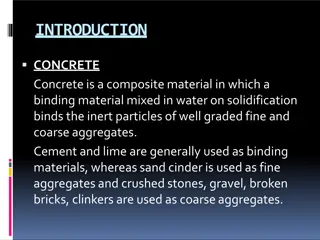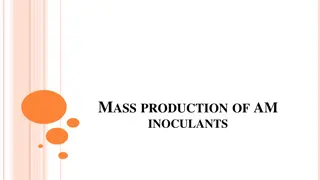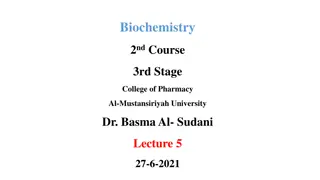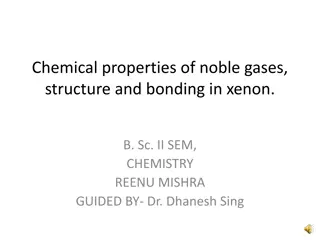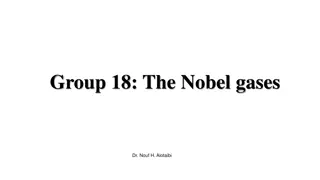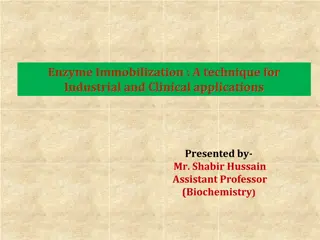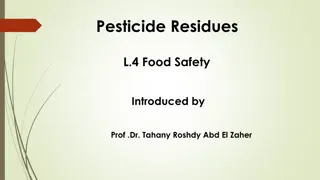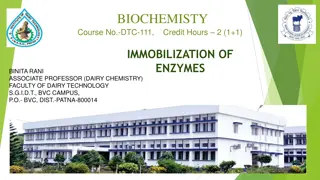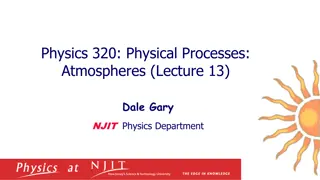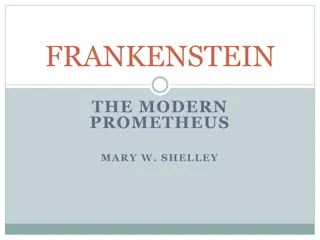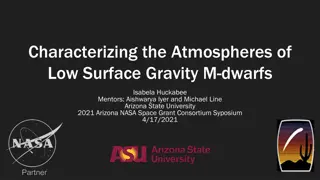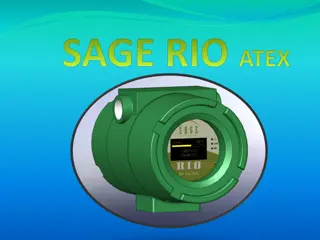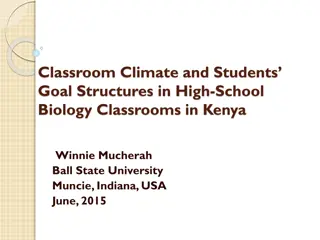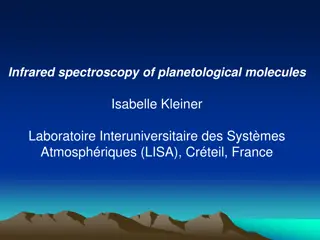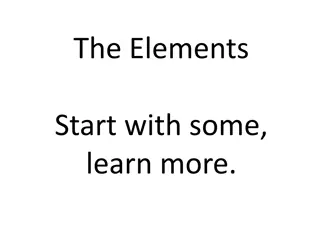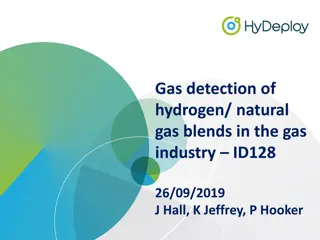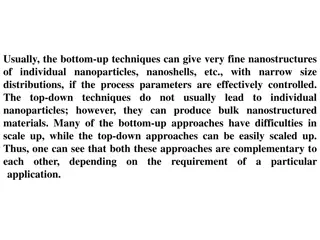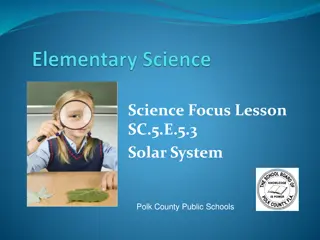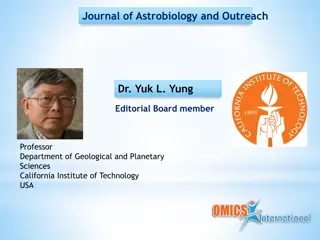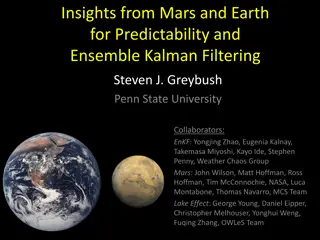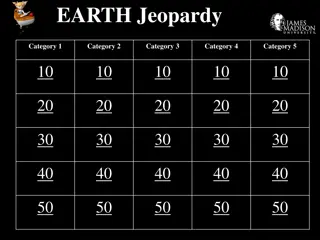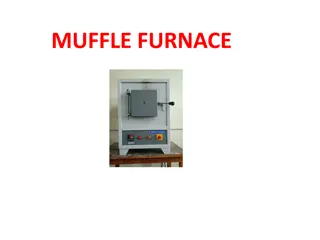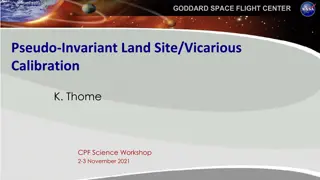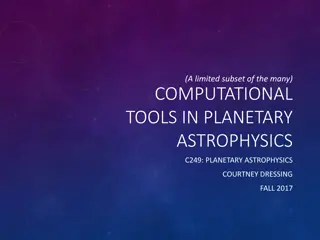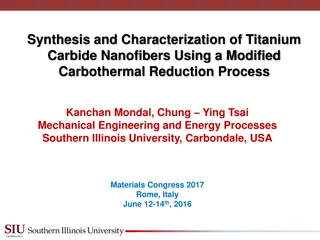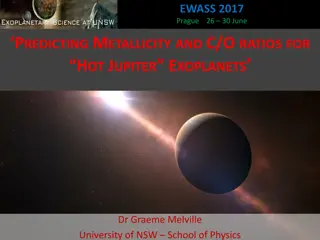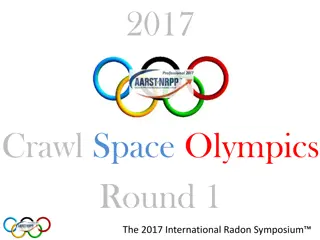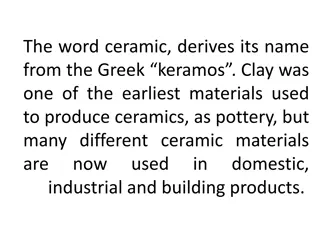Understanding Concrete: Types, Uses, and Classification
Concrete is a composite material composed of binding materials, water, and inert particles. It is classified based on binding materials, design, and purpose. Cement concrete is widely used in construction for its strength and durability, while lime concrete offers an economical alternative where cem
1 views • 48 slides
Understanding Pathetic Fallacy in Literature: An In-Depth Analysis
Delve into the world of literature as we explore how writers, such as Charles Dickens and Shakespeare, skillfully use pathetic fallacy to create specific moods and atmospheres. Learn about the connotations and effects of weather on storytelling while analyzing key literary works like "Oliver Twist"
0 views • 15 slides
Methods for Mass Production of AM Inoculants
Techniques for mass production of arbuscular mycorrhizal (AM) inoculants involve in vivo culture on green house plants, spore production with antibiotic treatment, field growth monitoring, and in vitro/axenic culture techniques. Solutions include using living roots, inert substances like vermiculite
1 views • 12 slides
Understanding Xenobiotic Metabolism for Biomedical Applications
Metabolism of xenobiotics, foreign chemicals like drugs, food additives, and pollutants, is crucial for pharmacology, toxicology, and disease management. Knowledge allows for beneficial applications such as antioxidant research, pollutant conversion, and drug biosynthesis using transgenic organisms.
0 views • 11 slides
Chemical Properties and Bonding in Xenon: A Study of Noble Gases
Noble gases, including xenon, exhibit unique chemical properties due to their stable electron configurations. Xenon forms compounds like xenon difluoride, xenon tetrafluoride, and xenon hexafluoride, showcasing various hybridization states and geometries. These compounds illustrate the reactivity of
0 views • 18 slides
Understanding Poetry: Analysis and Interpretation
Dive into the depths of poetry by exploring themes, speaker characteristics, emotions, setting, and poetic devices. Uncover the hidden meanings, tones, and atmospheres within the verses to grasp the full essence of the poems by Hardy and Housman.
1 views • 14 slides
Understanding the Gothic Genre Through Reading Comprehension Booklet
Dive into the mysterious world of the Gothic genre with a reading comprehension booklet featuring texts that will challenge your comprehension skills. Explore the eerie atmospheres, detailed descriptions, and captivating narratives that define this intriguing literary genre. Enhance your reading str
0 views • 15 slides
The Noble Gases: Properties, Sources, and Uses
The noble gases, including helium, neon, argon, krypton, xenon, radon, and Oganesson, are characterized by their low reactivity due to a complete electron configuration. They have diverse applications, such as forming inert atmospheres, medical treatments, and lighting technologies. Naturally occurr
0 views • 16 slides
Enzyme Immobilization: Techniques and Applications in Industry and Healthcare
Enzyme immobilization involves confining enzymes on inert supports for stability and reuse, enhancing efficiency and cost-effectiveness. Historical events and examples illustrate various methods and applications. Chemical modifications, such as PEG addition, have shown increased enzyme activity. The
0 views • 34 slides
Extraction Methods in Pesticide Residue Analysis for Food Safety
Extraction methods play a crucial role in separating pesticide residues from food matrices for analysis. Techniques involve using solvents to efficiently remove pesticides without causing chemical changes. The choice of extraction method depends on the substrate type, with liquid and solid substrate
6 views • 25 slides
Immobilization of Enzymes in Biochemistry
Enzyme immobilization involves confining enzyme molecules to a distinct phase from substrates and products, attaching them to solid matrices for enhanced specificity and reduced inhibition. Inert polymers or inorganic materials are used as carrier matrices with methods like physical adsorption onto
0 views • 24 slides
Understanding Atmospheric Physics: Ideal Gas Law and Maxwellian Distribution
Exploring the physics of gases in planetary atmospheres, this lecture delves into the ideal gas law which relates pressure, density, and temperature in an atmosphere. It introduces the concept of kinetic temperature and Maxwellian distribution, showcasing how gas particles distribute in equilibrium.
0 views • 12 slides
Analysis of Romantic and Gothic Elements in Frankenstein by Mary Shelley
This analysis explores the parallels between Mary Shelley's Frankenstein and Romantic and Gothic literary elements, delving into themes of creation, hubris, nature, and the supernatural. The narrative revolves around Victor Frankenstein's pursuit of creating life, intertwined with Romantic ideals an
1 views • 11 slides
Understanding Gothic Fiction Conventions
Explore the origins and key features of Gothic fiction, including dark settings, supernatural elements, and eerie atmospheres. Analyze gothic story openings and extract examples from works like Frankenstein to understand gothic features and emotional impact.
0 views • 25 slides
Characterizing the Atmospheres of Low Surface Gravity M-dwarfs
This study focuses on characterizing the atmospheres of low surface gravity M-dwarfs, which are promising hosts for exoplanets. The research delves into why low gravity M-dwarfs appear brighter in the infrared than typical M-dwarfs, presenting an improved base model with added opacities. The finding
0 views • 8 slides
SAGE Rio ATEX Atmospheres Explosibles - State-of-the-Art Equipment and Safety Measures
In this presentation, explore the cutting-edge SAGE Rio ATEX technology designed for explosive atmospheres. Discover equipment categories, gas protection levels, temperature codes, and gas zoning regulations. Learn about ATEX and Non-ATEX systems, communication protocols like HART and Modbus, and es
0 views • 23 slides
Influence of Classroom Climate on Student Goal Structures in High-School Biology Classrooms
Classroom climate plays a crucial role in shaping students' goal structures and learning outcomes. Research indicates that classrooms high in cooperation and cohesion lead to positive behaviors, improved academic performance, and favorable attitudes among students. The study also reveals that differ
0 views • 26 slides
Insights into Infrared Spectroscopy of Planetary Molecules and Space Exploration
Infrared spectroscopy plays a crucial role in studying planetary molecules like NH3, PH3, and CH3CN, aiding in planetary observations and spacecraft missions. Ground-based observatories and spacecraft like GALILEO and Cassini/Huygens provide valuable data for analyzing planetary spectra and modeling
0 views • 13 slides
Exploring the Fascinating World of Elements
Dive into the intriguing characteristics of different elements, from the peculiarities of Hydrogen to the inert nature of Helium, the reactivity of Lithium and Beryllium, the uniqueness of Boron, and the importance of Carbon in organic chemistry. Discover their properties, electron configurations, a
0 views • 62 slides
Exploring Exoplanetary Atmospheres with IGRINS at Seoul National University
This study delves into the analysis of exoplanetary atmospheres using IGRINS at Seoul National University. Through detailed observations and analysis, the study aims to uncover new molecular features and properties of these atmospheres. Instruments from previous studies such as NICMOS, CRIRES, OSIRI
0 views • 16 slides
Gas Detection of Hydrogen/Natural Gas Blends in the Gas Industry
Gas detection instruments play a crucial role in assessing the presence of hazardous atmospheres in the gas industry. This study focuses on the impact of adding hydrogen up to 20% in natural gas blends on gas detection instruments. The aim is to understand any potential inaccuracies in readings and
0 views • 30 slides
Comparative Analysis of Bottom-up and Top-down Nanomaterial Synthesis Techniques
Bottom-up techniques yield individual nanoparticles with narrow size distributions, while top-down methods produce bulk nanostructured materials. Physical Vapour Deposition (PVD) and Inert Gas Condensation (IGC) are examples of bottom-up approaches capable of synthesizing nanomaterials with precise
0 views • 10 slides
Understanding Gothic Fiction Conventions in Literature
Gothic fiction is a captivating genre rooted in dark, mysterious settings, supernatural elements, and eerie atmospheres. Originating with "The Castle of Otranto" by Horace Walpole, this genre has evolved to encompass elements like family curses, isolated castles, and sinister creatures. Dive into th
0 views • 25 slides
Gas Testing and Hazardous Atmospheres: Preparation and Safety Guidelines
In environments with potential hazards, it is crucial to prepare for gas testing to ensure safety. This involves identifying the type of gas or atmosphere to be tested, understanding common gases, asphyxiants, irritants, and corrosives, and maintaining equipment for accurate testing. Hazardous atmos
0 views • 40 slides
Exploring the Planets of Our Solar System
Discover the fascinating characteristics of the planets in our solar system, from the rocky surfaces of Mercury and Mars to the thick atmospheres of Venus and Earth, and the gas giants like Jupiter and Saturn. Learn about their sizes, temperatures, moons, and unique features that make each planet di
0 views • 19 slides
Dr. Yuk L. Yung - Professor of Astrobiology and Planetary Sciences
Dr. Yuk L. Yung is a distinguished editorial board member and professor at the California Institute of Technology, USA. His research focuses on planetary evolution, atmospheric chemistry, astrobiology, and global change, emphasizing synergistic interactions between modeling, experiments, and observa
0 views • 21 slides
Insights from Mars and Earth for Predictability with Ensemble Kalman Filtering
A collaborative effort between Penn State University and various teams explores the predictability of Martian and Earth weather phenomena using ensemble Kalman filtering. A comparison of key characteristics between Earth and Mars is provided, shedding light on their variable atmospheres and climates
0 views • 31 slides
Exploring the Early Earth: Origins of Life and Genetic Evolution
Delve into the mysteries of the early Earth and the origin of life through engaging categories such as the absence of certain gases in the atmosphere, the synthesis of amino acids in lab simulations, the formation of protocells using DNA, and the bombardment of space debris. Discover how reducing at
1 views • 26 slides
Advanced Plasma Cutting Machines at Arcraft Plasma
Arcraft Plasma offers high-quality plasma cutting machines capable of cutting ferrous and non-ferrous materials up to 150mm thickness. These machines come in 12 models with beveling and hole piercing options. The plasma cutting process involves the use of air or inert gas to create plasma that melts
0 views • 12 slides
Understanding the Versatility of Muffle Furnaces in Industrial Settings
Muffle furnaces play a crucial role in heat treating steel products and conducting various processes requiring controlled atmospheres. These furnaces, such as bench-top and portable configurations, are widely used in industries for applications like extracting zinc, testing precious metals, and heat
0 views • 20 slides
Radiometric Calibration Methods for Remote Sensing Applications
Techniques for radiometric calibration in remote sensing include vicarious approaches utilizing invariant desert sites, in-situ methods characterizing surfaces and atmospheres, and SI-traceable measurements for intercomparisons between sensors. The repeatability of in-situ results and comparison wit
0 views • 20 slides
Computational Tools in Planetary Astrophysics - Fall 2017
Explore a limited subset of computational tools in planetary astrophysics used for modeling planetary transits, secondary eclipses, phase curves, radial velocities, Bayesian parameter estimation, and atmospheric modeling. Tools include BATMAN, SPIDERMAN, RadVel, e.emcee, and Exo_Transmit, each servi
0 views • 7 slides
Synthesis and Characterization of Titanium Carbide Nanofibers using Modified Carbothermal Reduction Process
Titanium carbide nanofibers were synthesized and characterized using a modified carbothermal reduction process. The process involved the use of ethanol/methanol mixture, polyvinyl-pyrrolidone, HNO3, and titanium isopropoxide. Various techniques were employed to achieve the desired nanofiber morpholo
0 views • 16 slides
Understanding Gas Laws and Pressure Units
Gas laws relate pressure, volume, and temperature of gases in various units like atmospheres (atm), mmHg, kPa. Standard pressure is 1 atm with conversion factors. Understanding concepts such as STP, volume, temperature, and Dalton's Law of partial pressure is crucial for solving gas law problems. Ex
0 views • 38 slides
Prediction of Metallicity and C/O Ratios for Hot Jupiter Exoplanets
Dr. Graeme Melville from the University of NSW explores the modeling of atmospheres for hot Jupiter exoplanets, emphasizing the importance of temperature, PT profiles, metallicity, and the C/O ratio. Utilizing the Versatile Software for Transfer of Atmospheric Radiation (VSTAR), the research aims to
0 views • 27 slides
2017 International Radon Symposium: Crawl Space Safety Guidelines
The content discusses important safety guidelines related to working in confined spaces such as crawl spaces, attics, and pits as presented at the 2017 International Radon Symposium. Topics covered include the definition of confined spaces, permit requirements, written confined space programs, respi
0 views • 13 slides
Impact of M Dwarf Stellar Wind on Atmospheric Escape of a Mars-like Exoplanet
The study explores how the stellar wind from M dwarf stars affects the atmospheric escape of a Mars-like planet, focusing on the potential habitability of such exoplanets. Computer simulations utilizing stellar wind parameters provide insights into ion escape and the varying conditions at different
0 views • 19 slides
The Fascinating World of Ceramic Materials
Ceramic materials have a rich history stemming from Greek origins, with properties that make them versatile for various applications. They are known for being strong, stiff, chemically inert, and excellent insulators. From traditional pottery to advanced superconductors, ceramics play a vital role i
0 views • 4 slides
